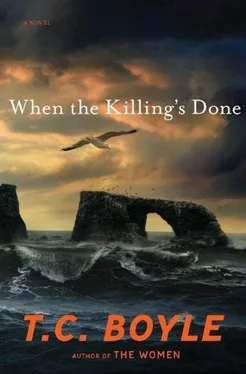The car is two blocks away, down a gently sloping street studded with meters and sloppily parked Volvos and Toyotas, mixed use, apartments and businesses side by side, the odd lawn, street trees, then around the corner to the cross street below. He’s walking now, striding along in his business-as-usual gait, forty-two years old and as fit as the gym and Dr. Reiser’s Lotensin and blood thinners can make him, ignoring the cars lined up at the light with their wipers clapping and the exhaust coiling out of their tailpipes in the last petrochemical gasp of the black stuff pooled up under layers of shale in Saudi Arabia and Nigeria and Venezuela, the death of the earth, the death of everything, smelling crushed worm, rotting leaf and the wet acidic failure of the newspapers stuck to the sidewalk where the Mexicans tossed them short of house stoops and storefronts in the grim desperate hour before dawn. He’s walking, thinking he won’t bother stopping in at any of the stores today — LaJoy’s Home Entertainment Centers, with locations in Santa Barbara, Goleta, Ventura and Camarillo — because whatever might be happening or not happening there on a day like this is not so much his worry anymore as it is the problem and responsibility of the individual store managers and Harley Meachum, who’s being paid more than he’s worth to do just that: worry.
Semi-retired. That’s his status and he’s earned it, because he’s done his scrambling and made his bundle and he’s got his house in Montecito and his two cars and his boat and Anise too, time on his hands now, just the way he wants it — just like the bum he finds standing there by the Beemer when he turns the corner, a lean philosophical-looking white-haired bum planted there as if he’s thinking of making an offer on the car.
And that’s an automatic thing with him, calling a bum a bum instead of one of the homeless or less fortunate or needy or apartmentally challenged or whatever the phrase of the week is, Anise forever trying to correct him on that score, because his sympathies lie with the animals that can’t help themselves — the pigs electroshocked into the killing chute, the chickens dismembered on the assembly line while they’re still half-alive and conscious, the rabbits and donkeys and sheep the Park Service slaughtered on Santa Barbara and San Miguel and Santa Cruz islands without batting an eye — and not some white-haired upright primate who’s had all the advantages of living in America instead of some third-world country and still just wants to plant himself in the grass and suck on a bottle all day long in infantile regression. Is this a fundamental inconsistency: pro-animal, anti-human? Let it be, because it’s no worse than the way the eco-cops see things, and with what they’re spending on brodifacoum and the helicopters to deliver it they could put up every bum in town at the Holiday Inn for a month.
His favorite bum, not that he’d ever actually give him anything and would be more than happy to see him put on a bus back to Echo Park or San Jose or whatever hole he dragged himself up out of, is a guy who must weigh three hundred pounds, always in a pair of shorts and workboots and a dirty white T-shirt the size of the sail on a Hobie Cat. He’s got concrete pillars for legs and a gut that climbs up out of the shirt like a separate living thing all ready to set up on its own. His modus operandi is to stand outside whatever restaurant he’s in the mood for, begging doggy bags off the pouchy sated half-looped tourists coming out the door. And don’t try to hand him sushi when he wants Italian, uh-uh. Not this guy. He knows what he wants. He’s discerning. He’s a gourmet.
But this bum, the philosopher, has just become alerted to his presence as if he’s awakened from a dream, eyes grappling toward him like fingers reaching for a ledge in the dark, and as Dave eases around the car to the driver’s side, the bum, in a voice of carbon and phlegm, says, “You got a dollar?”
Key in the lock, rain on his dreads, collar turned up, and there is no anger here because he’s got things to do, an appointment to keep, and no bum who isn’t worth the time it takes to look at him, at his stunted eyes and deflected wrists and salvaged rain-wet black-and-red-plaid flannel shirt that droops away from him like shucked skin, is ever going to get a nickel from him, let alone piss him off enough— You got a dollar? — to tell him what he really thinks about the moral valence of this little interlude. He just holds up his hand like a stop sign, ducks into the driver’s seat and lets the scene shift to leather and the glow of the dash and the sweet German-calibrated tune of the engine that sings the bum and the rotting newspapers and dead worms and all the rest to oblivion.
The traffic is backed up on State, but he turns onto it anyway, because he’s in no hurry and he wants a look at all the stores with their newly erected Christmas displays — just, he tells himself, to get in the Christmas spirit and not at all to focus a trained eye on the hordes of shoppers and calculate who’s doing what kind of business. His own stores — specialty shops for people with money who want the sixty-inch Sony LCD flat-screen wall-mounted TV and the top-of-the-line Linn electronics imported from England with the five mini-speakers and the big subwoofer all set up for them in their media room so all they have to do is tap the remote to be engulfed in a truly theatrical experience — are never crowded, no matter the season. It’s always been that way, even as he transitioned from the audiophiles of the eighties to the big-screen TV and surround-sound aficionados of the nineties and now the zeroes. No, his business is high-end, appealing to a need rather than a want, the society closing down day by day, people investing in home entertainment because they’re increasingly reluctant even to go out into the backyard, let alone to the movie theater or anyplace else. His clientele is ready-made — they practically come to him — and he’s always had the luxury of forgoing advertising and of locating in the more modest retail spaces off the main drag, where the rent’s lower and you don’t need all the bells and whistles.
Still — and he’s looking at Macy’s now, women parading in and out with their shopping bags strung from both arms, striding along the sidewalk with real satisfaction radiating from the play of their haunches and the no-nonsense strut of their heels — he has to admit the big displays are something, all that color and glitz, all that slick retail über-perfection that makes the shoppers want to attain über-perfection themselves, and in the easiest way possible, by spending money. Make me over. Make me well. Make my eyes bigger and my gut smaller, my calves harder and my hair fuller. Make me beautiful and successful and above all longed for, admired, loved. Sure, and how about a home entertainment center while we’re at it?
It’s just past ten but the colored lights girdling the palms are lit and softly shining against the long descending backdrop of the rain-misted street, which sinks through the center of the shopping district and down through a maze of surf shops and eateries to the pier, where it intersects with Cabrillo, the Ocean Boulevard of Santa Barbara, famous as a tourist attractant and the earthly paradise of the peripatetic bum, broad, spacious, palm-lined, and stretching along the ocean from the cliffs at East Beach to the marina at its western verge, which is where he’s headed. He stops for the red at the intersection, wipers intermittently snatching away the misting rain. Directly across from him is the fountain at the base of the pier, and for a moment he’s distracted, thinking of the twenty-something bum in the top hat and scarlet jacket — and what is it with bums today? — who used to work the fountain with a generic Disney dog he’d dressed up in a crinoline tutu and taught to dance on its hind legs while the water leapt and flared in the background. King of the bums, that kid, the tourists lining up to empty their pockets for him. Of course, he’s gone now, probably pushing a shopping cart down an alley someplace, the hat crushed, the dog dead, the rest of his life one long continuous road to nowhere.
Читать дальше












